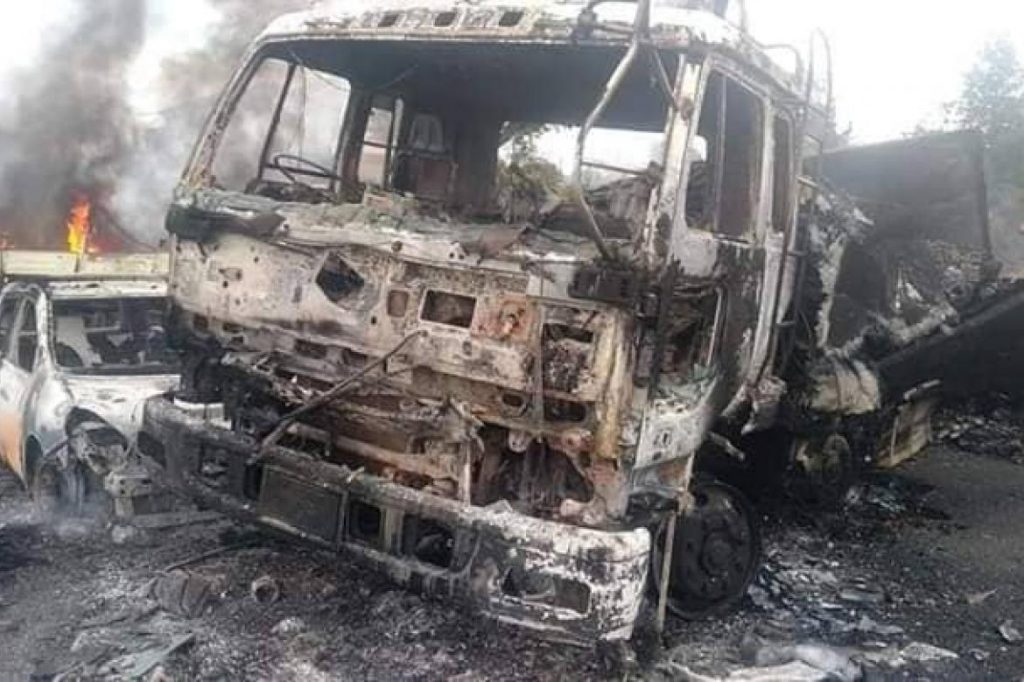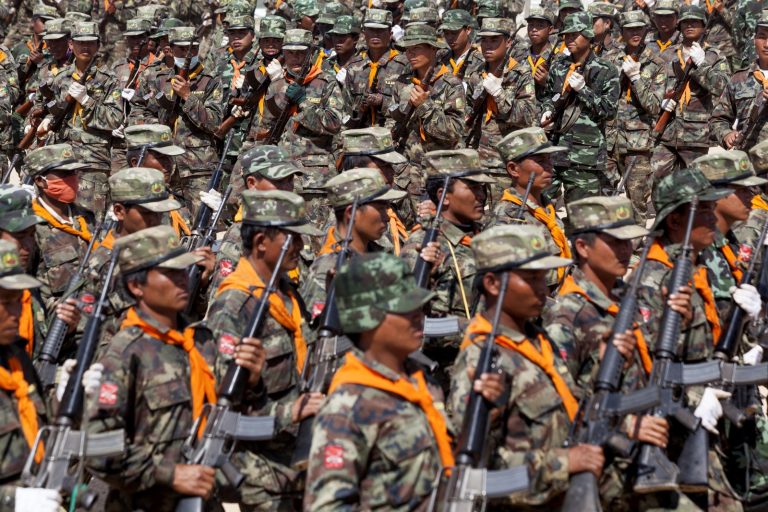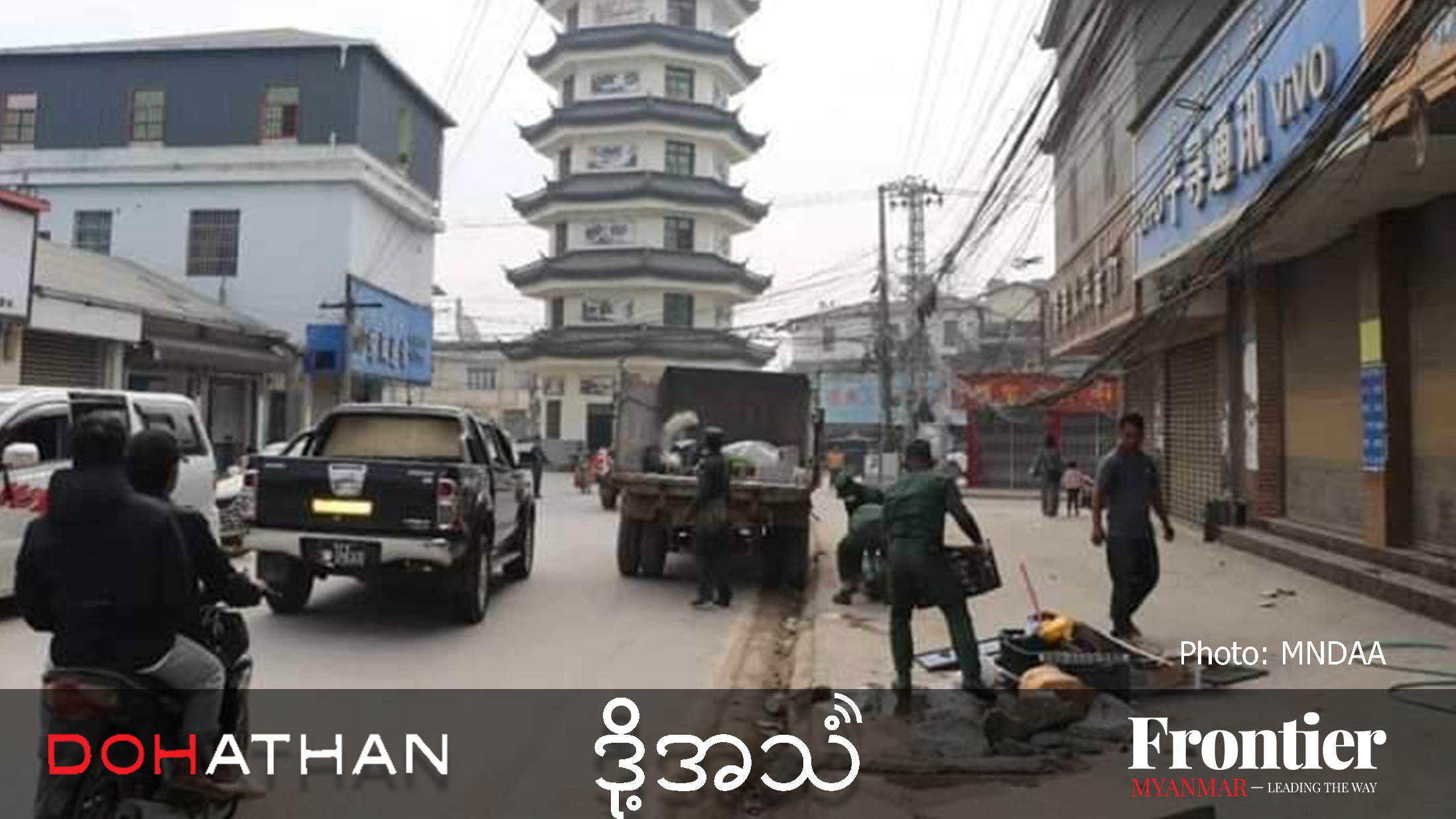By KYAW LIN HTOON | FRONTIER
YANGON — A group of 20 armed men in plain clothes blocked the highway near Kutkai in northern Shan State on September 3 and set fire to seven southbound vehicles, after ordering their drivers and passengers to hand over their money and mobile phones.
No casualties were reported in the incident, which took place at about 6pm near Namkut village, about 16 kilometres (10 miles) north of Kutkai, on the main trade route between Myanmar and China.
Three of the drivers told Frontier that armed men ordered about 30 people to leave the vehicles, before splashing them with petrol, setting them on fire and fleeing.
Most of the vehicles were trucks transporting textiles and other goods loaded at Muse, on the border with China. They were en route to Lashio and the Mandalay Region capital, Mandalay, their drivers said.
Support more independent journalism like this. Sign up to be a Frontier member.
Frontier asked the drivers who was responsible, but they were unable to identify the assailants.
“The leader of the group told us not to look at them. However, I saw that some members of the group were wearing T-shirts without badges, and they wore army caps,” said one driver who asked not to be named.
“They could speak multiple languages, but I don’t know what the languages were.”
The Northern Alliance said in a statement on September 4 that it was not involved in the incident. Its troops saw the burning vehicles when they were fighting the Tatmadaw in the jungle near Namkut, the statement said.
The Northern Alliance also apologised for the inconvenience caused to travellers by the fighting, which has hindered movement along the main trading route between Myanmar and China since three of its members launched a series of brazen coordinated attacks on August 15.
About 70 percent of overland trade between the two countries passes along the highway.
Brigadier-General Zaw Min Tun, a spokesperson for the Tatmadaw’s True News Information Team, said the Northern Alliance was responsible.
“This is obvious, it’s just a lie,” he said of the September 4 statement. “There were no clashes at all around that area on that day. It’s not good that they released a statement full of lies after they did whatever they want.”
Villagers in Namkut hosted the stranded travellers overnight because humanitarian groups believed it was unsafe to take them back to Kutkai, said Ko Htwar, of Brahmaso Humanitarian Aid, a social service group.
Early on September 4, social service groups received permission from authorities, including the military and the General Administration Department, to pick up the stranded drivers and passengers. he said, and four Kutkai-based groups sent seven ambulances to the village to rescue them.
Ko Htwar and the drivers said there were no casualties or injuries.
The incident comes as fighting between the Tatmadaw and three Northern Alliance members – the Ta’ang National Liberation Army, Arakan Army and Myanmar National Democratic Alliance Army – has escalated since the August 15 attacks on military, infrastructure and other targets.
The attacks have sparked clashes and military operations across Lashio and Kutkai townships, just a few hours from the Myanmar-China border, resulting in at least a dozen civilian deaths and displacing almost 8,000 people, according to the UN Office for the Coordination of Humanitarian Affairs.
The fighting has occurred despite the Tatmadaw extending its unilateral ceasefire – first announced on December 21, 2018 – to September 21.
A joint statement by 364 Myanmar civil society organisations on September 4 called on all parties in Shan to cease hostilities, respect international human rights and humanitarian law, protect civilians and ensure unimpeded humanitarian access to displaced people and those trapped in conflict areas.
On August 31, Northern Alliance members, including the Kachin Independence Army, met representatives of the government’s National Reconciliation and Peace Center at Kengtung in eastern Shan to discuss a bilateral ceasefire agreement aimed at ending the recent clashes.
The Northern Alliance said on September 4 that the armed groups would no longer carry out attacks in northern Shan because they hope to achieve peace through dialogue, but that they would continue to defend themselves against Tatmadaw offensives.
Zaw Min Tun told Frontier that the Tatmadaw would try to end the fighting through dialogue.







